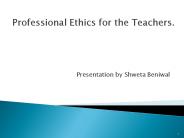Professional Ethics - PowerPoint PPT Presentation
1 / 29
Title:
Professional Ethics
Description:
'A vocation or occupation requiring advanced education and training, and ... act in accordance with a rule (Kant). Principle of Utilitarianism ... – PowerPoint PPT presentation
Number of Views:124
Avg rating:3.0/5.0
Title: Professional Ethics
1
Professional Ethics
- Module B
2
Moral
- Relating to, dealing with, or capable of making
the distinction between, right and wrong in
conduct. (Websters Dictionary)
3
Ethics
- the study of standards of conduct and moral
judgment moral philosophy. (Websters
Dictionary)
4
Profession
- A vocation or occupation requiring advanced
education and training, and involving
intellectual skills, as medicine, law, theology,
engineering, teaching, etc. (Websters
Dictionary)
5
Ethical Theories
- Imperative Principle
- act in accordance with a rule (Kant).
- Principle of Utilitarianism
- balance of good over evil, consequences
- Generalization Argument
- What would happen if everyone acted this way?
6
Independence Standards
- AICPA
- Professional Ethics Executive Committee
- Independence Standards Board (in the SEC Practice
Section of the AICPA) - SEC
- Note that the Sarbanes-Oxley Act of 2002 is
changing the rules.
7
AICPA Code of Professional Conduct
- Module B
8
Authority
- The Code derives its authority from the bylaws of
the AICPA - Enforcement
- Joint Ethics Enforcement Program
- Penalties
- Membership terminated or suspended
- Complete CPE and/or practice review
- Warnings or no action
9
AICPA Code Sections
- Principles of Professional Conduct
- Rules of Conduct
- Interpretations of the Rules
- Ethics Rulings
10
Rule 101 Independence
- A member in public practice shall be independent
in the performance of professional services as
required by standards promulgated by bodies
designated by Council.
11
Independence shall be impaired if during the
engagement a member
- Had or was committed to acquire any direct or
material indirect interest in the client. - Was a trustee or executor as above.
- Had jointly held investment, (material)
- Had a loan except as permitted
12
Independence impaired if during F.S. period or
engagement he/she
- Was a promoter, underwriter, trustee, director,
or officer - Was a trustee for any pension or profit sharing
trust of the enterprise
13
Independence Issues
- Former practitioner and firm independence
- Accounting services
- client must accept responsibility for F.S.
- Member cannot assume role of management or
employee of the organization - Member must comply with all standards
- Honorary directorships and trusteeships of
not-for-profit organizations
14
Independence Issues
- Loans from financial institution clients
- Permitted
- Auto loans collateralized by automobile
- Surrender value under life insurance policy
- Borrowings fully collateralized by cash deposits
at same institution - Credit cards with balance less than 5,000
- Grandfathered (prior to January 1, 1992)
- Home mortgages and other secured loans
- Loans immaterial to members net worth
15
Independence Issues
- Litigation between client and member
16
Rule 102 Integrity and Objectivity
- In the performance of any professional service,
a member shall maintain objectivity and
integrity, shall be free of conflict of interest,
and shall not knowingly misrepresent facts of
subordinate his or her judgment to others.
17
Rule 102 Integrity and Objectivity
- Objectivity
- Without bias
- Integrity
- Of sound moral principle, upright, honest,
sincere. - Free of Conflicts of Interest
- Not knowingly misrepresent facts
- Not subordinate judgement to others
18
Rule 201 General Standards
- A member shall comply with the following
standards and with any interpretations thereof by
bodies designated by Council. - A. Professional Competence
- B. Due Professional Care
- C. Planning and Supervision
- D. Sufficient Relevant Data
19
Rule 202 Compliance With Standards
- A member who performs auditing, review,
compilation, management consulting, tax or other
professional services shall comply with standards
promulgated by bodies designated by Council.
20
Bodies Designated By Council
- FASB
- GASB
- AICPA Committees and Boards
- Accounting and Review Services Committee
- Auditing Standards Board
- Management Advisory Services Executive Committee
21
Rule 203 Accounting Principles
- GAAP must be followed by client
- Exception Rule 203 Opinion for departures from
GAAP when auditor agrees
22
Rule 301 Confidential Client Information
- Cannot disclose confidential information without
specific consent of client.
23
Rule 302 Contingent Fees
- Cannot receive contingent fees from audit,
review, examination, or compilation engagements. - Cannot receive contingent fees on tax return
preparation.
24
ET Section 400 Responsibilities to Colleagues
- Reserved.
25
Rule 501 Acts Discreditable
- Retention of client records
- Discrimination in employment
- Failure to follow standards in Government
audits - Negligence in preparation of FS or records
- Failure to follow Government requirements
- Disclosure of CPA Exam questions
26
Rule 502 Advertising
- False, Misleading, or Deceptive Acts
- Engagements obtained through others
27
Rule 503 Commissions and Referral Fees
- Prohibited from audit clients
- Disclosure required for other clients
28
Rule 504
- Deleted.
29
Rule 505 Form of Org. Name
- As permitted by State Law Council.
- Misleading names
- two year wording has been deleted.
- Members of the AICPA































